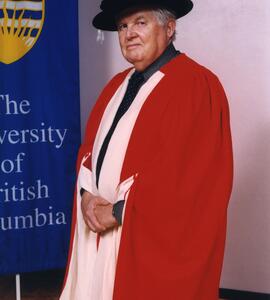In Memoriam
Professor Robert Mundell, who died on April 4 at the age of 88, was one of the preeminent economists of his era, receiving the 1999 Nobel Prize in Economics. His ideas — often controversial — helped to establish a European currency and to promulgate the “supply-side” economic theories that the US implemented under Ronald Reagan in the 1980s. He remains an important figure for modern macroeconomics, and his influence underlies the very language of our political discourse.
Mundell was born in Kingston, ON, on October 24, 1932, to William Mundell, OBE, and Lila Teresa Hamilton. After World War II, his family moved to BC, and Mundell began his studies at UBC a few years later.
At the time, UBC was unusual among economics departments for teaching older economic theories that predated John Maynard Keynes. Mundell attributed his unorthodox ideas in part to the classical, pre-Keynesian grounding in economic theory that he received as an undergraduate student. After UBC, Mundell studied at the University of Washington, earned his PhD at the Massachusetts Institute of Technology, and became a postdoctoral fellow at the University of Chicago, where he had fiery debates with Milton Friedman, another iconoclastic Nobel laureate. Mundell returned to UBC to teach before he moved permanently to Columbia University in 1974.
When they awarded him the Nobel Prize in 1999, the Swedish Academy wrote that Mundell’s predictions about the international economy were chosen with “uncommon — almost prophetic — accuracy.” He is remembered as a luminous, challenging, and foundational thinker.
























